#and part of that involves seeing howl live in his own bizarre way and deciding she's going to live in her own bizarre way
Explore tagged Tumblr posts
Note
nothing to add but i agree 100%!!! i love the line where she realizes she’s into howl and her reaction is “UGH i can’t believe that the suit i accidentally enchanted to make him hot worked on me too!!! this is so embarrassing” and then the narrator is like “unfortunately she was just as into him when he was wearing other clothes” like she’s so in denial GOD BLESS
wait actually i thought of one thing to add, sophie chops the charmed suit up into pieces in the same chapter where she cuts up and then enlarges his other suit (absolute menace) so it’s not even intact when she’s trying to blame it for her feelings
okay i see you’re obviously a fan of hmc, as you should, but i have a question cause i read the book but people on tiktok pissed me off (as booktok usually does i’m about ready to get rid of it) and a lot of people were saying it’s weird that people love the relationship even though sophie “didn’t really love him” because she was charmed. but i was like no y’all i thought she really loved him?? like she stays with him to have a kid right so???
ok. here is a real way to comment on this yippee! this is actually aweslome because i get to do my little sophie rant.
first of all and most importantly - sophie was never charmed by howl. quite the opposite, really, which i would argue is how she fell for him in the first place.
“Oh, confound that gray-and-scarlet suit!” Sophie said. “I refuse to believe that I was the one that got caught with it!” The trouble was the blue-and-silver suit seemed to have worked just the same. She stumped a few steps further. “Anyway,’ she said with great relief, “Howl doesn’t like me!”
this is by far one of my favorite sophie moments in the whole book: and i understand the confusion here for more than one reason (will explain more later!) but clearly she’s using the gray and scarlet suit as a euphemism because she’s in denial. after everything she’s seen of him, sophie refuses to believe that she could fall in love with someone who is so intrinsically flawed—however, as we find at the end of the book—they’re the same in that respect.
howl is by no means a bad person or an evil person in the slightest, and despite herself sophie falls in love with him because of his kindness (like most people do, anyway) here’s some times that they bond …
More about Howl? Sophie thought desperately. I have to blacken his name! Her mind was such a blank that for a second it actually seemed to her that Howl had no faults at all. How stupid! “Well, he’s fickle, careless, selfish, and hysterical,” she said. “Half the time I think he doesn’t care what happens to anyone as long as he’s all right-but then I find out how awfully kind he’s been to someone. Then I think he’s kind just when it suits him-only then I find out he undercharges poor people. I don’t know, Your Majesty. He’s a mess.”
“Behold the new Royal Wizard,” he said. “My name is very black.” Then he began to laugh, much to the surprise of Sophie and Michael. “And what did she do to the Count of Catterack?” he laughed. “I should never have let her near the King!” “I did blacken your name!” Sophie protested. “I know. It was my miscalculation,” Howl said.
Howl pointed a shaky hand up toward the canopy of his bed. “That’s why I love spiders. ‘If at first you don’t succeed, try, try, try, again.’ I keep trying,” he said with great sadness. “But I brought it on myself by making a bargain some years ago, and I know I shall never be able to love anyone properly now.” The water running out of Howl’s eyes was definitely tears now. Sophie was concerned. “Now, you mustn’t cry-”
“If you come out here alone, bring your stick to test the ground with,” Howl said. “It’s full of springs and bog. And don’t go any further that way.”
As she had feared, the hard black-and-white daylight coming through the broken wall showed her that Howl had not bothered to shave or tidy his hair. His eyes were still red-rimmed and his black sleeves were torn in several places. There was not much to choose between Howl and the scarecrow. Oh, dear! Sophie thought. He must love Miss Angorian very much. “I came for Miss Angorian,” she explained. “And I thought if I arranged for your family to visit you, it would keep you quiet for once!” Howl said disgustedly. “But no-”
Howl rose up on his hands and knees with a scramble. “I can’t stay,” he said. “I’ve got to rescue that fool Sophie.” “I’m here!” Sophie said, shaking his shoulder. “But so is Miss Angorian! Get up and do something about her! Quickly!”
Howl looked a little sad, but he said, “We were both hoping you would. Neither of us wanted to end up like the Witch and Miss Angorian. Would you call your hair ginger?” “Red gold,” Sophie said. Not much had changed about Howl that she could see, now he had his heart back, except maybe that his eyes seemed a deeper color-more like eyes and less like glass marbles. “Unlike some people’s,” she said, “it’s natural.” “I’ve never seen why people put such a value on things being natural,” Howl said, and Sophie knew then that he was scarcely changed at all.
and finally…
“Sophie,” said Martha, “the spell’s off you! Did you hear?” But Sophie and Howl were holding one another’s hands and smiling and smiling, quite unable to stop. “Don’t bother me now,” said Howl. “I only did it for the money.” “Liar!” said Sophie.
howl and sophie are meant for each other! they compliment each other immensely, and it’s difficult to describe how well they do so concisely. what i can pin it down to is this: nothing is secret between them. they operate like best friends as well as they do as lovers; they never let anything slide between them! sophie refuses to take howl’s shit when he crosses a line, (and howl vice cersa, especially when sophie is putting herself down) but they also know each other well enough to truly know their intentions when they say anything. a great example of this in hmc is this whole conversation:
“Why did you pretend to run away? To deceive the Witch?” “Not likely!” Howl yelled. “I’m a coward. Only way I can do something this frightening is to tell my self I’m not doing it!” Oh, dear! Sophie thought, looking round at the swirling grit. He’s being honest! And this is a wind. The last bit of the curse has come true! The hot grit hit her thunderously and Howl’s grip hurt. “Keep running!” Howl bawled. “You’ll get hurt at this speed!” Sophie gasped and made her legs work again. She could see the mountains clearly now and a line of green below that was the flowering bushes. Even though yellow sand kept swirling in the way, the mountains seemed to grow and the green line rushed toward them until it was hedge high. “All my flanks were weak!” Howl shouted. “I was relying on Suliman being alive. Then when all that seemed to be left of him was Percival, I was so scared I had to go out and get drunk. And then you go and play into the Witch’s hands!” “I’m the eldest!” Sophie shrieked. “I’m a failure!” “Garbage!” Howl shouted. “You just never stop to think!” Howl was slowing down. Dust kicked up round them in dense clouds. Sophie only knew the bushes were quite near because she could hear the rush and rattle of the gritty wind in the leaves. They plunged in among them with a crash, still going so fast that Howl had to swerve and drag Sophie in along, skimming run across a lake. “And you’re too nice,” he added, above the lap-lap of the water and the patter of sand on the water-lily leaves. “I was relying on you being too jealous to let that demon near the place.”
sorry for the chunky quote, but this is super super important for our two silly little characters and their dynamic!!
and as for the misconception that sophie was charmed by howl:
mrs. pentsemmon actually hints when she meets sophie that she cursed the grey and scarlet suit herself (out of jealousy, though she’d never say it) and the original passage says that;
The trouble was the blue-and-silver suit seemed to have worked just the same.
Sophie knows for a fact that she felt the same about Howl when he was wearing the blue and silver suit that she did when he wore the enchanted one, and she knew from that that she most definitely wasn’t affected by the charm.
also! a little note about misconceptions in general: the first time i read hmc, the ending scene felt out of nowhere. but that’s how subtly dwj worked in the character development throughout this story! at it’s core hmc is a character based story, and howl and sophie are the most important characters (sophie especially!) but in the first read through i think we all focused on the plot a little more since we didn’t know that was what it was. every read through since, i’ve seen how howl and sophie fall in love in real time! and it’s undeniable then. :3
anyways! relationships written by a woman always win fr. thanks for listening to my rant if you made it this far. and my good friend @thatfoolsophie if you have anything to add, please do to this already crazy long post lmao :3
#if ppl find the romantic plotline minimal that's completely fair#headcanoning sophie and/or howl as some shade of aro/ace is popular for a reason!#i feel like the central thread of the story is sophie's coming of age and her romance with howl plays into that as she decides that#being weird and hardheaded and unpalatable and happy with yourself is a way better way to live than bending to the expectations of others#and part of that involves seeing howl live in his own bizarre way and deciding she's going to live in her own bizarre way#and you know what they can do that together bc they both want to and they're happy and it doesn't matter what anyone else thinks#so i really ENJOY the romance but i don't feel like the story is super romantic#however. i think 'she didn't love him -> she was coerced into staying with him' is a poorly supported interpretation#chavahlah tag
219 notes
·
View notes
Text
SUMMARY Former NYPD Captain Dewey Wilson is brought back to the force and assigned to solve a bizarre string of violent murders after high-profile magnate Christopher Van der Veer, his wife and his bodyguard are slain in Battery Park. Executive Security, the private firm employed by Van der Veer, blames the murders on terrorists, but knowing that the victim’s bodyguard was a 300-pound Haitian with voodoo ties makes Wilson skeptical. With pressure to solve the case coming from both the Police Commissioner and the Mayor, Wilson is partnered with criminal psychologist Rebecca Neff.
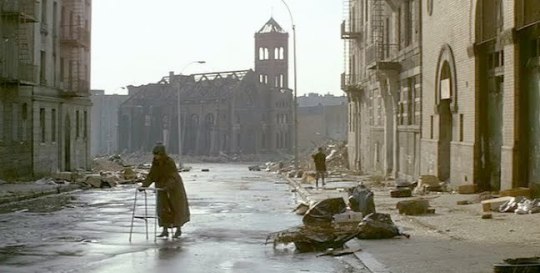
Elsewhere, in the South Bronx, a homeless man explores an abandoned church that is scheduled to be demolished by Van der Veer’s development company. He is killed by an unseen monstrous being. Wilson and Neff investigate his murder. At the church, apparent sounds of a baby crying lure Neff up to the bell tower. Wilson follows her but does not hear the crying; once Neff is separated from him, he hears a wolf howl. He goes up after Neff and drags her to safety. Later that night, a bridge worker is apparently murdered by the same creature.
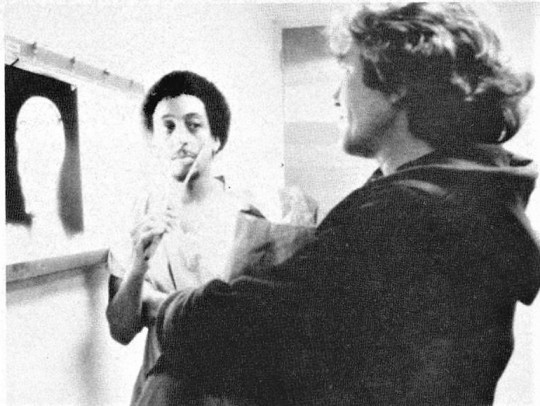
Coroner Whittington discovers non-human hairs on several victims and consults a zoologist named Ferguson, who identifies the hairs as belonging to an unknown subspecies of Canis lupus. Ferguson compares wolves to Indians. Inspired, Wilson finds Eddie Holt, a militant Native activist he arrested some years previously, working in construction. While Wilson interrogates Holt on top of the Manhattan Bridge, Holt claims to be a shapeshifter, which implicates him as the killer. Wilson opts to leave Holt alone and tail him that night.
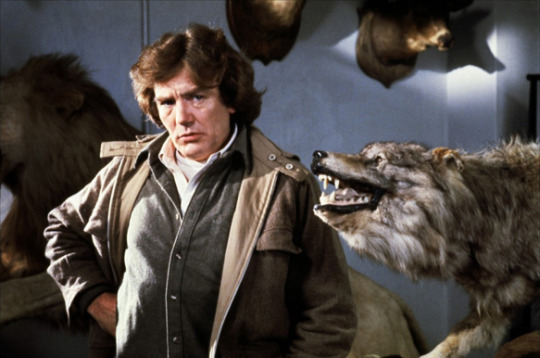
Following animal clues, Ferguson goes to Central Park, where the killer ambushes him in a tunnel. Wilson spends the remainder of his night with Neff where they have sex. The following morning, a man in a jogging suit rides Ferguson’s motorcycle past Wilson as he leaves Neff’s apartment. Whittington and Wilson stake out the church, armed with sniper rifles and sound equipment; after Whittington almost blows his ears out by opening a beer can near a parabolic microphone, an animal that appears to be a wolf kills him. Meanwhile, Executive Security apprehends a “Götterdämmerung” terrorist cell in connection with the Van der Veer slaying.
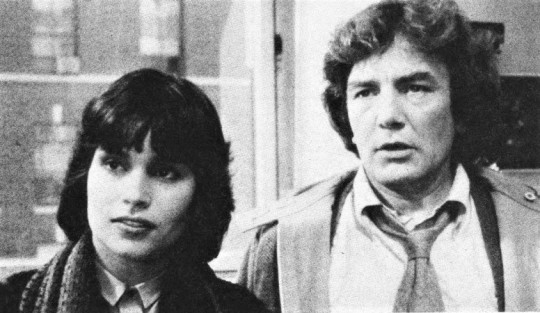
A traumatized Wilson escapes the church and finds himself at the nearby Wigwam Bar, where Holt and his friends are drinking. The group of Natives reveal the true nature of the killer as “Wolfen”, the wolf spirit. They explain that the Wolfen have extraordinary abilities and “might be gods”. Holt tells Wilson that he cannot fight the Wolfen, stating: “You don’t have the eyes of the hunter, you have the eyes of the dead”. The leader of the group, the Old Indian, informs Wilson that Wolfen kill to protect their hunting ground. Wilson resolves to end his involvement in the Van der Veer case but he, Neff and Wilson’s superior, Warren, are cornered on Wall Street by the Wolfen pack. Warren is decapitated while Wilson and Neff flee.
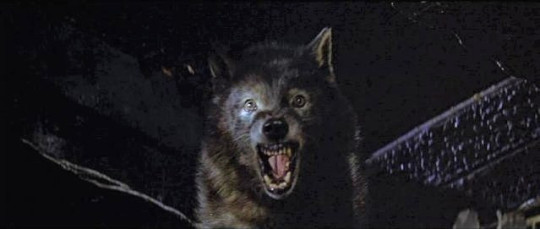
Wilson and Neff are cornered in Van der Veer’s penthouse by the pack, led by its white alpha male. Wilson smashes the model of the construction project that threatened their hunting ground, trying to communicate that the threat no longer exists and that he and Neff are not enemies. The Wolfen vanish just as the police barge in. Wilson claims the attack was made by terrorists. In a voiceover, Wilson explains that Wolfen will continue preying on weak and isolated members of the human herd as humans do to each other through class conflict. Wolfen will continue being invisible to humanity because of their nature; not that of spirits but predators, who are higher on the food chain than humans. The last scene is Eddie and his friends looking at the city from the bridge.
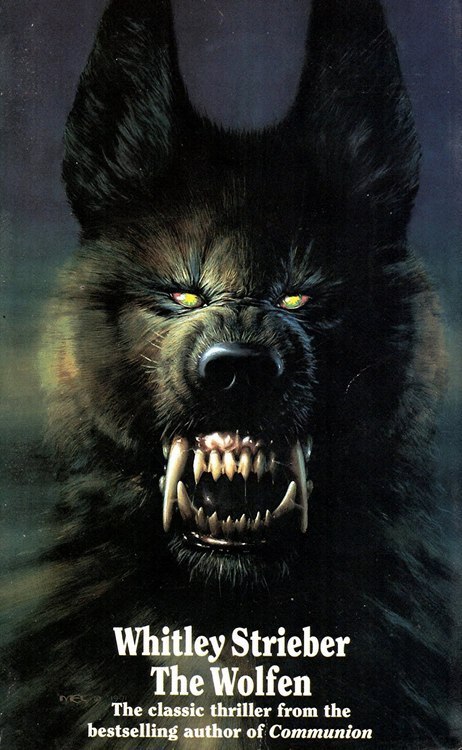
DEVELOPMENT/PRE-PRODUCTION In adapting The Wolfen, director Michael Wadleigh and co-screenwriter David Eyre decided to expand freely upon Whitley Streiber’s original prose. Streiber’s novel worked well as a “police procedural,” but they felt his storyline needed to become more impassioned for celluloid. And, although the basic plot remains the same, Wadleigh wanted to make his film more “socially relevant.”
“What appealed to me about Wolfen was its underlying allegory about nature,” Wadleigh says. “I wanted to play that up much more in the film. The genesis of the Wolfen’s culture is that when white man first came to America, he came as a farmer. His two basic enemies were the hunting tribes: wolves and Indians. The wolves and Indians were simpatico, and accommodated each other. White farming man wiped them, the forest, and the great American buffalo out. We reduced the wolf population from a high point of two million to fewer than one thousand. What’s fictional in our screenplay is that the wolfen are the product of biological/artificial selection. When we destroyed the original wolf population, only the smartest survived. The bright ones got even smarter. Their forests were all gone, so they moved into the new wilderness: the slum areas of the major cities. For survival, they hunt at night. For protection, they only eat people that our society doesn’t give a shit about, the inhabitants of the slums. These people are never missed, so their murderers are never looked for.”
A possible hole in Wadleigh’s concept is that since his wolfen have a special understanding with Indians, they would probably also recognize impoverished blacks and Puerto ricans as “brother” victims of modern society.
“Being humanitarians or ‘wolfitarians, explains the director, “as they also are in Whitely’s book, the Wolfen only take people who are essentially ready to die. It’s almost an eastern philosophy of euthanasia. They would not kill a healthy black man. They would kill an ancient derelict who was ready to die. First, the Wolfen would check him out very carefully to make sure he wanted to give up his life. The Wolfen have a tremendous empathy for the people they kill.”
By putting the Wolfen on the same level as Indians, Wadleigh seems to be reducing Indians to yet another stereotype.
“I avoided that by making our Indians real,” defends Wadleigh. “I’ve lived with them as neighbors in Wyoming, so I know what they’re like. Indians are not the kind of preachy, sanctimonious crowd that so often gets horribly portrayed in films. The Indians that I know are incredibly clever and have a great sense of humor. What happens early in Wolfen is that Wilson is led to believe that Christopher VanderVeer’s murder might have been done by radical Indians. He goes to see Eddie Holt [Edward James Olmos], whom he’s busted before, where he’s working on fixing something on top of the Manhattan Bridge. At the foot of the construction site, Wilson tells an old Indian to bring Eddie down for questioning. The Indian says, ‘Screw you. You want him, go on up there yourself.’ Wilson precariously makes his way up to the bridge by walking up its suspension cable. When he gets to the top, there’s a great dialogue between him and Holt that I ripped off from things I’ve heard Indians say in real life. Wilson asks, ‘Are you in touch?’ Holt answers, ‘With what, my mother?’ Wilson says, ‘No, with mother nature.’ Holt says, ‘Sure. I swim like a fish and screw like a bunny.’ Olmos, after people see him as Holt, is going to be a big star. People will be left with envy of Indians. It’s a whole other subculture that they’ll want to get into. It’s not Eddie’s speeches they’ll remember, but his being.”
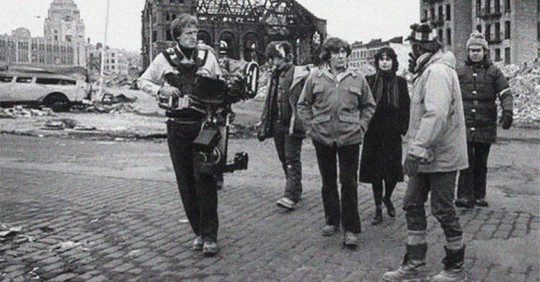
Olmos enhances the performances of movie veteran Albert Finney as Wilson. Finney, a two-time Academy Award nominee, decided to make Wolfen his first film in five years due to his love for the character” and the project.
“David Eyre and I changed the Wilson character from the book,” reveals Wadleigh. “Now, he’s a cop in his forties who’s the best homicide detective around. What he’s begun to realize, however, is that his professional life is a fraud. He’s a hunter for society but he only stalks small game. The real criminals, the people who control society, are never brought to justice because they set up the law to protect themselves. Wilson’s become much more of a 1960s type of character, which allowed me to work out a lot of my own personal philosophy. I was thrilled when Albert decided to play him, because in my opinion, he’s one of the greatest living actors.”
A less significant character alteration was changing Wilson’s first name from the novel’s George to Dewey.
“That was for a clever line of dialogue that is representative of my bad jokes and corny puns that riddle the film,” Wadleigh grins. “Rebecca Neff is sitting in Wilson’s office and she looks at his coffee cup and says, ‘Dewey.’ He says, ‘Yeah. I was named for one of Donald Duck’s nephews. I was the middle duck.’I mean, what could we have done with the name George?
“There’s another scene that’s been driving people up the walls. It occurs towards the end of the film when the main characters are staking out the Wolfen in the South Bronx. Wilson’s up in one building and Gregory Hines, as the black medical examiner, Whittington, is in one across the street from him. Wilson is trying to call Whittington on his walkie-talkie and he isn’t answering. Wilson starts panning his infra-red sniper scope-the way in which man sees at night-over these burned, wrecked buildings and doesn’t see anything. The audience will become convinced that Whittington’s been offed. Finally, Wilson’s scope comes upon one window where Whittington is standing with his pants down, mooning him. Wilson says over the walkie-talkie, ‘Very funny. Whittington turns around with a big shit. eating grin on his face and says, ‘Black moon over Manhattan.’ Some of the executives at Orion were saying. “What is mooning?’ I told them, “Don’t worry about it. The moviegoers will understand.’ The scene is doubly funny because of the legend of the full moon and werewolves. In fact, I suggested to Orion that part of Wolfen’s logo could be Gregory Hines’ ass. I don’t think that they took that too seriously, though.”
Wolfen’s cast enjoyed Wadleigh’s offbeat sense of humor. But since the director had previously only been a documentarian and this was his first dramatic movie, he might have run into trouble with his cast whenever he suggested to them that they modify elements of their portrayals.
“We avoided those clashes,” Wadleigh states, “because we were all united in believing that we were there solely to do the best we could. Every one of the actors got involved to the extent that they did for two reasons: their character and the film. They opted for a personal choice. They always made sure that not only was something that they were doing going to be good for their part, but for the picture as a whole as well. Since they had a basic respect for the project, they weren’t dealing with glorifying my ego, but Wolfen itself.”
PRINCIPAL PHOTOGRAPHY/LIVE WOLVES When it came time to use actual wolves, Wadleigh ran into difficulties because he was shooting on location. The majority of Wolfen was shot in New York City, utilizing Staten Island, Central Park, the New York Stock Exchange, the Manhattan Bridge, the Fulton Fish Market, Battery Park, the South Bronx, and the historic sound stages of Queens’ Astoria Studios.
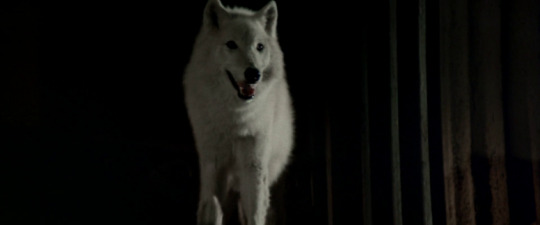
“Not only did we have to fence in the area where we were shooting our wolf scenes,” he discloses, “but Manhattan sent down police sharp shooters. They were under orders to shoot to kill if the wolves got out of the fenced-in area. The other side-effect of using the wolves was that, naturally the cast and crew were afraid of them. The mythology that the wolf is the devil is absolutely permeated through everyone’s conscious and subconscious. We make use of that in the film by having a church in the Dresden part of the South Bronx. By association, the audience will automatically think that the devil is somehow involved with the murders. The other thing that’s scary about the wolves is that they’re large. We were working with a 150 pound animal that when it stands up has its head six feet and six inches above the ground. What assuaged everyone’s fear was that the wolves are beautiful creatures. Their elegance is disarming. We used that element in the film as well. I think that throughout Wolfen, people will expect that the murderer is going to be a hideous werewolf or Alien-type creature. What they finally see are these gorgeous, noble animals. The audience will wind up with empathy for them.”
Wadleigh avoided the problems normally associated with dealing with animals in movie making by turning to expert trainer George Toth.
“I think we had the best wolves in America,” Wadleigh says. “George raised his wolves so that they think that they’re humans or that humans are wolves. Therefore, they have a respect for us. A very significant point, however, is that a wolf is not a dog. Wolves’ intelligence ranks just beneath the great ape’s, the whale’s, and the dolphin’s. We were dealing with a high powered rifle. You can’t really order a wolf to do anything, you have to ask him. If one of our wolves didn’t feel like doing something, there was no way we were going to force him. Since we were dealing with an animal that was essentially its own person, we had to wait for the mood to do something to hit him which consumed time and patience. In the end, though, they always came through amazingly well.
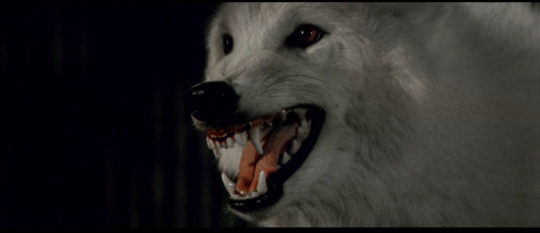
“As good as our wolves and techniques for showing their senses were, though,” Wadleigh continues, “they didn’t allow us to illustrate what I thought was Whitely Streiber’s greatest creation: the Wolfen’s internal thought processes. We solved that problem by introducing Indians to the story. Who better could explain the dignity of the Wolfen and their point of view? The particular irony of the Indians, this destroyed race of people, is that they are the best high steel construction workers in the world and are now building the white man’s great monuments: bridges, the World Trade Center … They, like the Wolfen, look upon the white man with incredible disdain, yet the both of them are forced to live in our great, corrupt cities.”
Michael Wadleigh
Interview with Michael Wadleigh You’ve expressed frustration in the past that Wolfen has been labeled a horror film. Do you have something against the genre? Michael Wadleigh: Yes, but that’s not the point. I never thought I was making a horror film. I thought I was making a political thriller about a detective investigating activists who are killing off very rich people, and have a political and social agenda that is still made very clear in the movie. The way I photographed and presented the wolves, they never, ever growled or snarled, because that would demean their intelligence and make them stupid in my view. I wanted to make them this shadowy e presence that was very much in control of the situation, and even more frightening. I mean, I was all for killing everyone in sight! [Laughs] That didn’t bother me at all.
The Baader-Meinhof Gang is mentioned in it, and other terrorist organizations, and even recently, when the Twin Towers went down, a number of people read about Wolfen and said, “That was a film about terrorists.” There were critics who well-recognized the parallels between my film and, as Barack Obama’s ex-minister Jeremiah Wright said, “The chickens coming home to roost.” America had done many things abroad that were against its own ideals, and of course it had been done in the way we treated the American Indians. I don’t think there is anyone who disputes, with hindsight, the fact that we just stole their land and murdered them and drove them out of business-completely unacceptable behavior today. I’m just giving you an example of the anger and injustice that Eddie Holt (Edward James Olmos] well expresses to Dewey Wilson (Albert Finney).
The whole backdrop is what we did to the Indians, and the reason I killed off Van der Veer is also made clear: that his great-great-ancestor reputedly brought the first machine to America—the windmill-and that machine stands for the Industrial Age and the supposedly superior technology of the Europeans that just wiped out the Indians. They really couldn’t compete. I mean, doesn’t that sound right? It was all there in the film.
But you yourself once famously described Wolfen as “a thinking man’s horror film.” Michael Wadleigh: I don’t recall those words, but if I did, you obviously know what I mean because I just said what I thought of it. Maybe at one point I did say that, but I must insist that my memory isn’t that bad and I always thought this film was a political thriller-and why political? Well, I’ve just explained to you. I mean, we’ve got American Indians vs. white people.
What were the main difficulties for you and co-writer David Eyre in adapting Whitley Strieber’s novel? Michael Wadleigh: During the discussions I had with [Orion topper] Mike Medavoy, 1 talked about the wolves in terms of Moby Dick—which was not to be pretentious, but just to try to get an idea in there that Ahab was a kind of detective or hunter for his society, so to speak, who was obsessed with tracking down and killing the whale. As most people read Moby Dick, the whale stands for nature and Ahab’s obsession is misplaced, and he goes to his death not realizing it.
Well, I pitched the idea that the character of Dewey Wilson is sort of disconnected from nature, but then gets obsessed with tracking down the wolves. Eddie Holt shakes him up and says, “Well, you’ve pretty much destroyed nature in America, haven’t you? Look at the city look at the South Bronx area that resembles Dresden and the end of civilization. Aren’t you on the wrong side? Why annihilate the last of nature?” And in the end, Dewey quits the police force. He literally, in my screenplay, throws his gun and badge away and says, “F**k it!”
He can no longer uphold the values of a society that he feels is unjust, and now begins to question his own role as a defender of those values and a protector of people like Van der Veer. That’s what I pitched as kind of a way through the piece. Of course, there are no Indians at all in Whitley’s novel, and no political agenda, so you can see that the things I added were very strongly along the lines of a political thriller.
Much was made of the “alienvision” that represents the point of view of the marauding Wolfen. How difficult was that concept to realize? Michael Wadleigh: I’m speaking for cinematographer Gerry Fisher, Steadicam operator Garrett Brown and myself when I say that we were never entirely happy with that, but we were never too disappointed either. We kept playing around with various things, infrared photography and reprinting the colored layers and so on. Garrett, who not only invented the Steadicam but is considered the best operator by everybody, is 6 feet 8 inches tall and a very athletic guy who can run like crazy. He is also very smart, and so the first thing we got was the terrific Steadicam photography that makes you think there’s a mind behind the point of view, that we are actually looking out of somebody or something’s eyes. Next we added the coloration, the strangeness of the vision, and then we had the soundtrack and sound effects and all of those elements that—so the critics thought were put together well and added up to very intriguing and scary sequences.
Actually, I always thought that Wolfen was set in the future that it was a little bit of a science fiction film as well with the advanced hi-tech security force and the parallel that they were using infrared photography for their remote lie-detection systems. That was all deliberate, to compare nature and technology and have them sort of meeting in the future.
One of the best scenes is right after Gregory Hines is killed by the Wolfen, when Dewey stumbles into the Indians’ local bar. Michael Wadleigh: Well, that was the scene that I longed for, though it is a bit expositional. Eddie Olmos played the hell out of that, and the other Indians too, who were not real actors. They all did a good job, but Eddie, especially in a few words, conveyed the essence of the scene and then the way they all just laugh it off and so on. By the way, that was a real bar—not that it matters—but for authenticity that was the real steelworkers’ bar where the Indians hung out. We didn’t redecorate it or anything. I guess as a documentarian, I thought that was interesting, and would maybe lend something to it. Whatever was there and whatever they were dressed in, that was it. I’ve never been satisfied by the way Indians are sometimes portrayed in films, but they seem very real in that scene very dignified and eloquent and funny. Eddie had hung out with the Indians for quite a while and tried to get the cadence of how they spoke in that kind of clipped way of using very few words.
They did very good makeup on Finney, and I think he brought a lot of concentration to that scene—but it was slightly recut as well, so I wince a little bit. Nonetheless, I won’t complain. I believe that scene is great, and one can judge that all the general qualities of the film are there.
What was the difference in your version of that scene? Michael Wadleigh: Uh, let’s not go into that. Let’s be…I don’t want an alibi for anything. I’ll tell you the thing that still most upsets me, which is the marketing of Wolfen in general. I really thought that it could have had the horror film audience because the word would get out, but I also believed it would have captured those people who appreciated the Robert Ludlum sort of thing—a film that was a more of a sophisticated international thriller/detective story—but of course, that wasn’t the advertising campaign at all. All of the wolf material and general treatment that they added brought it more toward what I thought was a simplified horror film-and they thought so too. They thought that if they went that route, it would make more money. As a matter of fact, you may know that Orion was having trouble at the time and was, in my view and I said it at the time, a little bit desperate for a hit. I believe the critics, for one thing, think they made a mistake. They probably could have made more money going the other way. So that’s what I’d prefer to comment on. I only wish that it had gone that way.
The actual look of the Wolfen in your movie has aroused much debate. Michael Wadleigh: I felt that the film was much more of a nature allegory, and therefore I was never interested in making an artificial creature. What I decided to do was put the Indians and the wolves together as a team, so to speak, and therefore create a new creature by imagining an intimate association and communication between them. An amazing thing that I believe is mentioned in the film is that the Dutch colonists who first settled in New York actually used the same word “wolfen” to describe both the Indians and wolves. They of course knew the difference, but there were quite a few wolves around at that time, and those early colonists denigrated the Indians as savages and really felt they were different from full human beings. They felt that the wolves were so scary and powerful and this fear came out of European mythology as well—that they actually elevated the wolves’ intelligence and lessened the Indians, and in doing so sort of drove them together so that they were pack animals that were wild and ferocious and almost anti-real human beings.
That was the central interesting issue for me, that the Dutch were pushing the Indians and wolves together. Therefore you kind of had a bifurcated personality, and they were after all shape shifters. Well, we put it in the film when Eddie Holt shapeshifts on the beach. You have them sometimes looking like Indians and sometimes like wolves.
Legend has it that you once considered using midgets in masks to portray the Wolfen. Michael Wadleigh: Never! I can’t imagine where you got that from. That’s outrageous. Ask anyone who worked on the project. Anyone! As you know, we used real wolves, and what separates them from dogs is their elegance and concentration. Those damn things would look at you, and you would break your stare away from them. They had tremendous power and could really stare you down, and it scared the shit out of you. That worked as a strong setup to then go-pow! There’s a shadow, a splash of blood and you are gone! You unsettle the audience by using surreal sound effects, and watching a wolf’s jaws come up into frame and that kind of thing, but I still say that one of [the producers’] huge mistakes was going more animal with them. They should have stayed with the heightened surreal factor I intended, but instead they inserted shots I didn’t do and didn’t approve of, of the wolves growling. I was trying to convince the audience that these creatures had not only a powerful physique capable of delivering instant death, but an elevated intelligence—not to telegraph their presence to their victims ahead of time! I don’t want to go on about it, but I still feel very strongly about that one.
Was it difficult shooting with real wolves? Michael Wadleigh: Not at all, except that the paranoia of human beings is extreme. I mean, wolves are presented in all the movies as evil, and we have associated them in our mythologies with the devil and all of that kind of thing, but there are relatively few instances of a pack of wolves wiping out a human being. You should find some of the production stills from when we filmed the wolves in New York City. They had like a dozen armed policemen, you know, sharpshooters—I’m not kidding you—positioned all over the place because the wolves were considered wild, uncontrollable animals. I’m very serious. The police had their orders to shoot to kill if a wolf got out of the enclosure. They weren’t about to have one running around New York City! We all thought that was amusing, we who were used to dealing with animals. Their paranoia was, to my mind, unjustified.
You submitted a cut of Wolfen to Orion that was four hours and four minutes long and had over 36 SCENE MISSING cards spliced into it. Michael Wadleigh: Yes, but that was not the director’s cut I proposed to show to the public. What you are referring to is a cut that I had to supply to Orion and (producer) Rupert Hitzig and what have you. Bear in mind, Richard Chew is one of the most honored editors of all time. I mean, he’s won two or three Oscars for Star Wars and all that. You are not dealing with somebody walking in off the street. Richard took a position as well that we had simply not had adequate time, because the effects hadn’t been prepared and all sorts of other things had not been done.
Remember, I had shot the approved screenplay. I had not shot anything other than the script that was submitted, so that wasn’t the issue at all. We simply were not given enough time and, well, you can say that I’m an amateur, but this was Richard Chew—the editor they were delighted to get and had approved. And of course, it’s a matter of record that when Rupert wouldn’t go on with me, Richard just quit. He wouldn’t continue on the film. It’s just not correct that we were going to put a four-hour version out before the public.
No, I wasn’t implying that. I’m referring to the cut that was screened for Orion head Medavoy, Hitzig and others at the studio. Michael Wadleigh: That’s correct, but that had to happen. I told you before, it is well known that Orion was in deep trouble with all sorts of other films-check it out-and many people felt they were abnormally leaning on Richard and me to get this film out at any cost. You know, to hell with art! Just get it out there. Of course, a lot of things did go over budget-you better believe it—but I had no control over that. I was not the producer. I simply accepted all of these people and was mainly interested in the actors. I did want as the director to choose the actors, but hey, I’m just saying it’s a matter of public record that the whole crew was professional and that Orion selected them. I wanted pros, not amateurs, F#3 and many people took the position that it was Paul Sylbert, who was a celebrated production designer, who went nuts and really put the budget over the top with the sets and so forth and they were always consulting with him. I was a nobody by comparison.
So if the next step you might be going to is budget, then I think it was pretty well established in the Directors Guild arbitration that any overbudgetings were hardly my fault based on the information they brought forward. It didn’t seem to have any effect on whether I should be able to preview my cut of Wolfen.
Some critics complained that the subplot involving the security organization pursuing terrorists isn’t fully resolved in the film. Michael Wadleigh: That’s correct. I believe it is in David Eyre’s and my screenplay. We had a far greater integration of all the elements that were thrown out there, particularly two threads that I was interested in, and still am: the corporate vs. the government. After all, religion has gone, so the two great powers we have left are government and those companies. My sympathies have always been with government, and here Dewey (Albert Finney) is a representative of that. The film was always supposed to display the disdain that the corporations had for public gumshoes like him, the inadequacies of their financing and the smallness and shabbiness of even Dewey’s boss (Dick O’Neil] compared with the slickness of the privatization of law enforcement. That was supposed to be a big deal, but then those guys in private security can’t figure out dip-shit even with all their hi-tech stuff. They are completely on the wrong track, and ultimately it was supposed to be a vindication of government hunters over corporate hunters, so it tied up far more at the end than it did in the re-edited version.
None of those things were really pointed up in the cut that came out-and by the way, the other, more interesting parallel was maybe nature vs. technology. The wolves had that wolf-vision and when you saw them they were all very organic, and here the corporations were using all this hi-tech equipment and nature was still outperforming them. Also, you have Eddie Holt and the Indians compared to the people you see in the private security force, and the steelworkers’ bar compared to the austereness of Van der Veer’s office. All of those threads I’ve laid out were supposed to be yin-yang things which would tie together in the end-the one side losing and the other side winning in clever and different ways—and I believe the critics would have been much more satisfied by the version I would have completed. Yet at the time, certainly a number of critics did recognize those elements.
You have expressed satisfaction with Wolfen, even though it was recut. Michael Wadleigh: As it stands, I directed every scene in Wolfen except for the inserts they did. I believe it’s a matter of record that the additional photography they did to get the wolves growling and a few other things were a relatively small part of the movie. So in terms of writing and directing and even, as you know, I did some cinematography there is a lot of Michael Wadleigh in there, right? Everybody agrees with that. So how can I complain about it? Movies are a collective effort, and the set designer and the cinematographer and so many people contributed tremendous amounts to it.
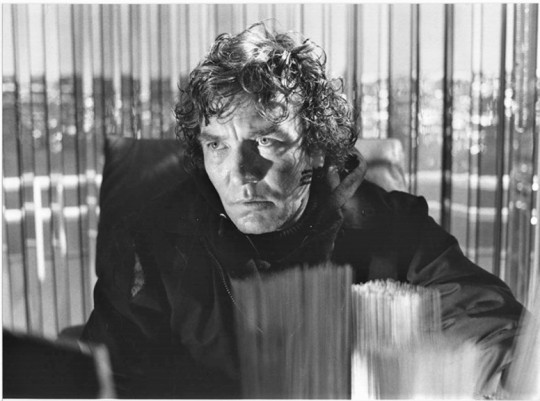
Were you ever offered another horror film on the strength of Wolfen? Michael Wadleigh: A couple. As I recall, the offers were pretty serious. I’m told that Stephen King really liked Wolfen, though I don’t recall that I ever talked to him, but there were a number of inquiries made. It never came to a script being sent out, because I always said, “I’m just not interested.” Stephen personally got someone to phone me, and then I was going to see him in Maine-I still have a house there to this day—but somehow we never met. Mike Medavoy immediately said, “Well, why don’t we do another horror film?” A number of other people did too. I turned them all down.
Would you welcome the opportunity to release a director’s cut of Wolfen today? Michael Wadleigh: I wouldn’t know how to do it! It was so long ago that I don’t think it can be done. I would welcome a re-release as it is right now, because I think, as I gather you do, that it’s a hell of a film, no matter whether it was recut or not. It’s got a lot of innovative stuff in it, and beautiful photography and thrills and chills, and I think that people might be amazed at the success it could have.
SPECIAL EFFECTS/WOLFEN-VISION When producers Rupert Hitzig and Alan King snapped up the rights to Whitley Striber’s shaggy wolf story back in 1978, they knew it would be difficult to translate the book’s unusual Wolfen point-of-view to the screen. In fact, when production on Orion Picture’s WOLFEN began back in October, 1979, the only thing that then-director Michael Wadleigh was certain of was that nothing about the so-called “alien vision” was certain.
But it’s doubtful that Hitzig, King or Wadleigh could have possibly conceived that their self-proclaimed “thinking man’s horror film” would still be mired in a expensive eleventh hour production launch just weeks before the scheduled release. Perhaps the most terrifying aspect of WOLFEN-at least to its makers-is that after 20 months, $15 million, four screenwriters, two directors and several special effects houses, crucial effects sequences remained incomplete. Just six weeks prior to its July 24 opening. a topnotch effects crew headed by STAR WARS alumnus Robbie Blalack-was still working frantically to complete WOLFEN’S opticals on time.
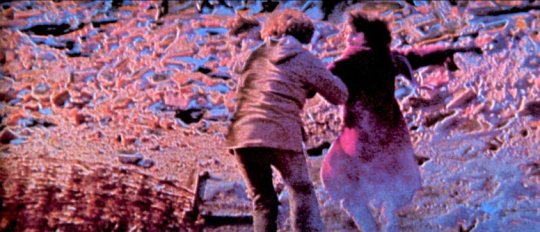
“We knew from the outset that filming the Wolfen point-of-view, or ‘alienvision’ as we call it, was going to be one elusive son of a gun,” said Rupert Hitzig during a break from a musical scoring session. “Nobody really went in with a master plan as to how to shoot the thing in a way that would give us complete manipulative editing and color control. Let’s just say that the whole thing has been at a great cost to my sanity, my family life and certainly my pocketbook.”
In preproduction, WOLFEN’S producers authorized a tidy $80,000 in seed money to effects houses on both coasts for generating footage that would approximate how the extraordinarily intelligent and sensorial-tuned Wolfen perceived the world.
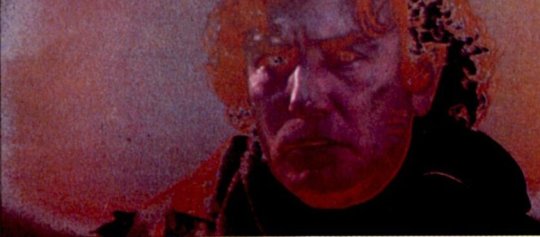
“When we started, we had a technical consultant who we assumed knew what he was talking about,” Hitzig said. “We were assured that they had this phenomenal new computer printout device with the capacity to generate 235 different shades of grey. Well, I found that astronomical amounts of money for start-up and programming were being asked for without anyone being willing to prove that it actually could be done! We wanted to do things that had never been done before on straight optical printers, but the footage looked all grey and colors fell off into nothingness. So we shut it down, looked around and went with Blalack’s company, Praxis.”
Praxis is among the new crop of small, sophisticated special effects houses that have sprung up in recent years. Blalack, who set up the shop after splitting with former partner Jamie Shourt, first met with Wadleigh and Hitzig in August, 1980, and was given ten weeks to show the producers what they could do. “I showed them ten years of work,” Blalack said, “right through to STAR WARS. At that point, Michael and Rupert were fairly specific about what they were after, but they were extraordinarily open to our input.”
Praxis was originally hired for three months of work, but due to several changes in concept and personnel-most important the replacement of Wadleigh with John Hancock late in 1980-they worked on WOLFEN for fully nine months. “They have tremendous fiscal responsibility and concern, and they’re crealive,” said Hitzig of Blalack and his crew. “Frankly, it was a welcome breath of fresh air.”
The first “alienvision” technique that Praxis explored was “smell-o-vision,” a Michael Wadleigh brainchild that centered on the Wolfen’s ability to sniff out their prey. “Since we obviously couldn’t hand out sniff cards to audiences, we tried to convey the idea that the Wolfen could snifftranslation: see-images of dozens of people who had recently passed through a particular setting,” explained Praxis’ optical supervisor Beth Block. “The Wolfen would sift through these images and seize on the person they’re tracking. The backgrounds would always be visible through and behind the rapidly moving images of extraneous people. When the Wolfen locate the person, the image would lock in and become intensely focused.”
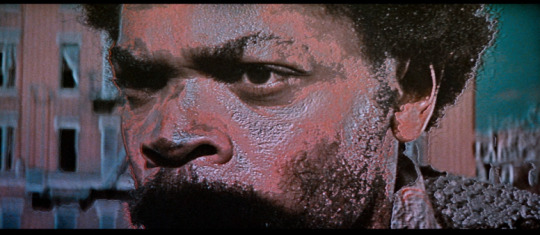
“To show their sense of smell, we used ghosted images. For example, when clues lead Wilson to the South Bronx, the Wolfen see him and make the connection that he’s on their trail. After he’s gone, they go to the spot where he parked his car. We see a series of ghosted images of things that have been there in the past: people, automobiles … That’s indicative of the smells that have been left behind. After all, smells are just molecules.”
Wadleigh’s “point of view shots” and “ghosted images” are bound to confuse audiences. “What can I say?” admits Director Wadleigh. “At first, it will be confusing, but I think it will sort itself out. People will go with it and not understand what it is until one of the characters explains it in the movie. It’ll be a healthy ambiguity. In my humble estimation, filmmakers don’t try enough interesting ideas.”
The “smell-o-vision” effects involved ghost-printing black and white figures over a color background. Though promising, the technique proved a backbreaker, since shots lasting only five to ten seconds were so image-dense that they required the equivalent of five minutes of film. “Smell-o-vision’ was a good idea, but the footage never really proved clear enough from an audience’s standpoint,” Beth Block explained “It just looked flashy.” When Michael Wadleigh exited WOLFEN “for political reasons” (the exact reasons are still unclear), “smell-o-vision” breathed its last.
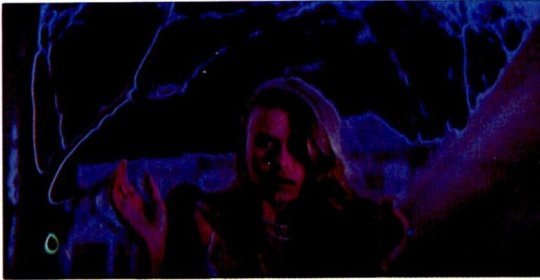
Praxis next began work on a suitable means of achieving the Wollen’s night vision, which is used to hunt their human prey. After rejecting footage simply shot night-for-night, Blalack began experimenting with the use of false color and color substitution. The results, according to those who saw the early tests, were judged phenomenal,” but it was decided that it looked too phenomenal for the film’s purposes.
“To this day, Robbie probably disagrees with the choices that have been made,” Hitzig explained. “I know he would just as soon have had a strawberry-pink sky and shimmering iridescent lights-gorgeous stuff-but it certainly placed the Wolfen at a distance from the poor mortal viewing the film. Blalack wanted to place the Wolfen’s sensory capacities in a world of utopian color. Orion Pictures and I just felt the footage was too radical a departure from normal vision. It was particularly jarring in the number of cuts we have that shift from objective camera to ‘alienvision.’ We held that the juxtaposition would distance the audience’s subconscious identification with the Wolfen, and in turn, with the picture itself. Obviously, that was something we did not want to do.”
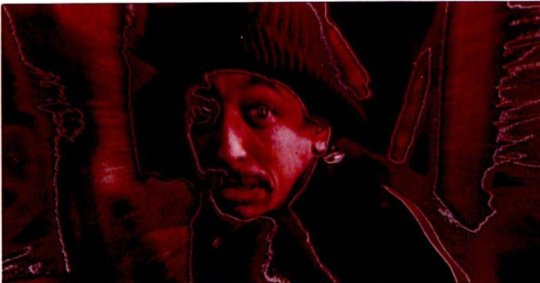
The rejection of the color replacement technique was a huge disappointment for Blalack and his crew, who felt they had come up with a truly startling visual scheme. “It was beautiful. It was really something special,” said Beth Block. “But did it approximate the way the Wolfen see? Maybe not. So we went with another approach that audiences could relate to, was filmically exciting and that worked within the story context. We realized that though some effects may seem old hat to us, they’re not to most movie audiences. And you don’t do effects to show off for other optical houses.”
The final “alienvision” design is still startling: a dark sky, a bright image and a sharp, jagged photographic outline on a figure in a color that signifies whether or not the Wolfen sees a human as prey. Blalack began with the assumption that the Wolfen could sense different emotional states as various colors; anger, fear and aggression would all be visibly different.
To properly isolate the desired foreground elements from the rest of the footage– which was shot without consideration to post production needs-contrast separations were frequently used, a technique also used in ALTERED STATES to add opticals to conventionally photographed footage. Using a wide range of film stocks and filters at various contrast levels, Beth Block was able to separate the flesh tones in a particular shot, alter it to taste, and recombine the footage to good effect. For several sequences, it was necessary to rotoscope the desired areas of the frame, a tedious chore handled by artist Pete Von Sholly.
youtube
Optical work was also required to enhance the actual look of the Wolfen. “At one point, Michael and I considered using midgets with masks.” Hitzig said, “but that would have undermined the allegorical feel we were after and take the picture into the realm of the grotesque. It’s true we were both anxious not to lay any of the Wolfen’s attributes to real wolves, a species that’s already pretty maligned. But in the end, we decided to go with real wolves, doctoring them to be totally black. I also felt strongly that Robbie and his crew should work on giving the Wolfen a light energy-an aura, almost-that separates them from looking like normal wolves.”
Praxis began experimenting on this “aura” in May, 1981, using new footage of the beasts that had been reshot by John Hancock. One option Praxis developed, dubbed the “searchlight mode,” involved shooting two beams of light against a black velvet drop, and then superimposing that onto the footage. The result, according to many at Praxis, was as nerve jangling as a lighthouse. Another attempt had animators tinting the eyes of the animals a violent blue, The “ole blue eyes” approach was torpedoed too, as were experiments with pinpoint lasers, which gave the Wolfen a semi-intentional VILLAGE OF THE DAMNED look. Eventually, Blalack, Hitzig and Hancock agreed on a white, milky glow of filaments around the Wolfen’s orbs, accomplished by tedious rotoscoping that was finally completed just five weeks before the film opened nationally.
Wolf Attacks/Make Up Effects WOLFEN’s makeup effects also went through several major changes during the course of filming, contributing to the film’s expense and delay. Makeup artist Carl Fullerton had signed up on the project back in the summer of 1979, having just completed a stint on ALTERED STATES assisting Dick Smith. But when Orion Pictures ordered a halt to principal photography in February, 1980, several makeup effects had yet to be filmed and several others had to be rushed to completion.
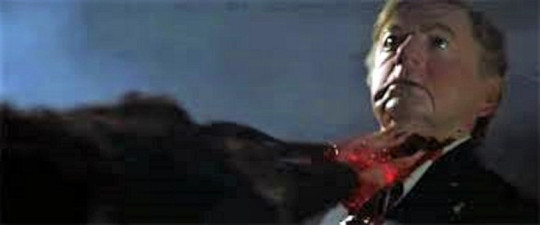
“Although I was given plenty of time to generate and test the specific effects that were called for, two of the major effects were left until the last day of New York locations, so it was a rush job,” Fullerton explained. “I had to ship a lot of effects out to the West Coast and wasn’t there to supervise that shooting. Initially the word was that the horror and gore were going to be soft-peddled, so they left that for the last thing to be shot. Later the approach changed so the shock stuff was in demand again.”
Fullerton, who had yet to see a final cut of the film at the time of his interview, had many lengthy meetings with Wadleigh to discuss the specific effects required. “Unlike many directors who never tell you what they’re after until they’re ready to shoot, Michael would sketch ideas on paper. He wanted to do things that had never been done on camera, and he made that process so much more open.”
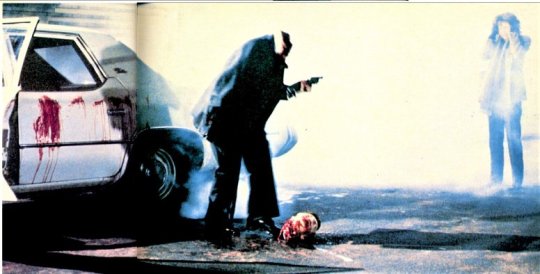
Early in the film, the Wolfen murder two wealthy New Yorkers, Christopher and Pauline Vandervere (Max Brown and Ann Marie Pahtako) in New York City’s Battery Park. ��Michael didn’t want the audience to fully see the creatures or to see that they were actually ripping out their victim’s throats,” Fullerton said. “He decided just to show blood dribbling from the man’s mouth. I wasn’t pleased with that. Not only was it boring and a cliche, it isn’t medically feasible.”
Instead, Fullerton suggested-and Wadleigh adopted-a spurting flow of blood from actor Max Brown’s mouth. “Dick Smith gave me some helpful advice,” Fullerton said, adding that the effect was somewhat similar to Smith’s torrent of pea soup in THE EXORCIST. “Smith suggested I attach a denture clip into the actor’s mouth, then attach tubing to it. I later found a way to actually direct the blood flow.” The tubing came up the back of the neck under Brown’s hair, over his cheek and into the corners of his mouth. Latex appliances camouflaged the mechanics. To film blood flowing from Brown’s nose, Fullerton had him lie down on a large platform to which a camera had been attached. The platform could tilt up and down like a teeter-totter, but the camera would see no such movement. Open-ended blood capsules were inserted into Brown’s nostrils while his head was near the ground; when the platform was tilted upwards, gravity caused the blood to flow realistically.
The script also called for the Wolfen to tear the hand off of Syad (John McCurry), the Vandervere’s Haitian bodyguard. When a false arm proved impractical, Fullerton devised a clever, on-camera effect. “We had the actor reach into his jacket with his own hand, grabbing for a gun in a shoulder strap,” he said. *The camera point-of-view is a wolf charging at him and the actor aims the gun at the ‘wolf.’ Meanwhile, something from the left side of the screen pushes into him and knocks his hand out of the frame. While out of view, I clipped an appliance over his arm-a flexible fiberglass stump spewing blood on his face and upper chest. We avoided a cutaway and the man ostensibly loses his hand on camera.”
This slideshow requires JavaScript.
More grisly effects were required for the death of a derelict named Mule, whose throat is ripped out by the Wolfen. It was one of several makeup sequences designed by Fullerton but shot during post production in Los Angeles because of his commitments on EYEWITNESS and FRIDAY THE 13TH-PART II. Unlike simple wounds, ripping out a throat required an appliance with substantial depth to it. Fullerton conducted extensive tests on himself before developing an appliance built up with fiberglass, epoxy and latex. “I actually remade the neck area.” Fullerton said. “The appliance fits under the jawline to simulate the whole neck and upper chest area. It had to allow the performer plenty of facial and body mobility-his only limitation would be really fast movements. The appliance was strapped to the actor’s chest and carefully glued to the lower jaw and neck.
“I have to say it was more successful on me,” Fullerton added. “I have a stronger jawline than the actor used in the scene.”
But the most demanding makeup assignment of all involved the Wolfen’s bold decapitation of a New York police commissioner (Dick O’Neill) in the middle of Wall Street. Although most of the sequence had been filmed on location in the financial district, the closeup of the Wolfen attack was to be shot in the studio. Though it’s a key sequence, it was left for the last day of shooting.
“Since there was really no other way to do the scene, I built a dummy head.” Fullerton said, “But a rigid dummy head would look just terrible if it wasn’t animated.” To provide the needed movement, Fullerton built a flexible neck out of gelatin and supported the head with an aluminum rod connected to a universal joint. The mouth was able to open and close, and a simple flick of the wrist on a control handle allowed an operator to move the head realistically in any number of ways.
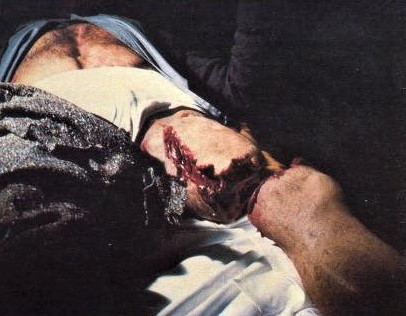
But problems arose when Fullerton’s dummy head met Eoin Sprott’s puppet wolf: it was difficult to get the wolf to attack both on target and at the proper speed. After several unsuccessful attempts, the plan was scrapped and Fullerton was forced to devise a solution on the spot, since filming had to wrap that day.
“Originally, Michael did not want a decapitation,” Fullerton said, “he just wanted to see the neck being bitten off and pushed out in front of the camera. After doing a shot, Michael decided that he wanted to change it and have a decapitation, but the dummy wasn’t built for that. So we had to do some surgery on it: open up the back of the neck, cut the whole supporting structure out and resupport it using a tongue depressor! The neck was prescored and had piano wires at the base of the skull. We had Eoin Sprott’s puppet head lunge at the neck of the dummy. At that point, I whirled the head off!”
youtube
In addition to filming the complex decapitation on the last, hectic day, Fullerton also set up and filmed an insert shot of Dick O’Neill poking his head through a section of fake pavement and rolling his eyes. In addition, the bloody death of Christopher Vandevere was also shot in that same day. But other planned effects could not be squeezed in and were executed in post production by makeup artist Allen Weisinger: the ripping out of the vagrant’s throat, described above; a close-up of John McCurry’s severed hand lying on the ground, the fingers twitching and still clutching the gun, achieved by having an actor stick his hand through a section of fake pavement and adding a latex stump; and a shot of Dick O’Neill’s head flying through the air spewing blood from its nose and mouth, achieved with a false head with built in canisters of stage blood and compressed air that was literally tossed up and down for the camera.
“The terrific thing was working with Michael,” Fullerton said. “But I have to admit that the pressure of doing everything at the last minute made it pretty frustrating. I can’t wait to see the movie, though, to see what got left in and what got left out.”
New York as one of the films Main Characters (Great Article @ NYC In Film about NY during the production of Wolfen)
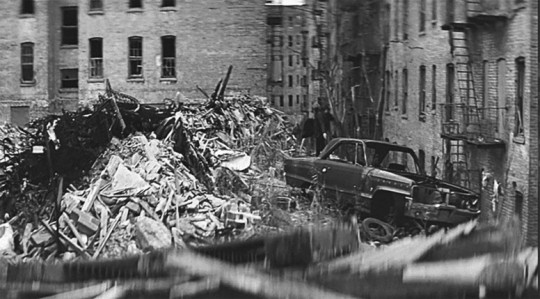
PROMOTIONAL/ADVERTISING
youtube
This slideshow requires JavaScript.
SCORE/SOUNDTRACK Wolfen (1981) The Unused Score by Craig Safan
youtube
Composer Craig Safan wrote an original score for this film and was replaced at the last minute by future Academy Award winner James Horner, who had only 12 days to write and record his score.
youtube
CAST/CREW Directed Michael Wadleigh
Produced Rupert Hitzig
Screenplay David M. Eyre, Jr. Michael Wadleigh Uncredited:Eric Roth
Story by David M. Eyre, Jr. Michael Wadleigh
Based on The Wolfen by Whitley Strieber
Albert Finney as Dewey Wilson Diane Venora as Rebecca Neff Edward James Olmos as Eddie Holt Gregory Hines as Whittington Tom Noonan as Ferguson Dick O’Neill as Warren Dehl Berti as Old Indian Peter Michael Goetz as Ross Reginald VelJohnson as Morgue Attendant James Tolkan as Baldy Donald Symington as Lawyer Tom Waits as Drunken Bar Owner (uncredited)
Makeup Department Frank Bianco Carl Fullerton Allen Weisinger Michael R. Thomas
CREDITS/REFERENCES/SOURCES/BIBLIOGRAPHY Cinefantastique V11n03 Fangoria#028 Fangoria#013 Fangoria#301
Thanks to Mark E. [email protected] for allowing me to link his great informative article on old school NY.
Wolfen (1981) Retrospective SUMMARY Former NYPD Captain Dewey Wilson is brought back to the force and assigned to solve a bizarre string of violent murders after high-profile magnate Christopher Van der Veer, his wife and his bodyguard are slain in Battery Park.
0 notes
Text
The Summer of Eavesdropping
A short story by Brian Bourner
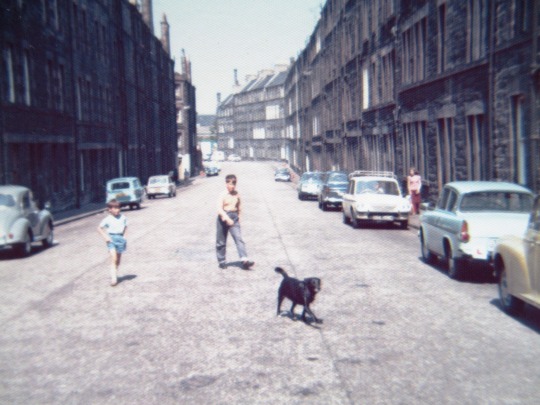
They crouched in the small seven by five foot airless and musty boxroom which adjoined the living-room in this one bedroom plus boxroom tenement flat. Some dim light percolated through from the living-room, via the only window, which was closed and located high up on the dividing wall. They couldn’t help making tiny rustling noises as they squirmed, cupping their ears to the wall, desperately trying to hear the muffled voices of conversation on the other side of the divide.
‘Did you hear that?’ Tony whispered incredulously. ‘They’re going to attack us.’
‘Shhh,’ muttered Gerry, his finger across his lips.
It wasn’t really eavesdropping; it was war and, as they say, all’s fair in love and war.
They could have been soldiers hidden in haylofts behind enemy lines. Or they might have been spies in a café cellar, their secret hiding place, tapping out Morse code messages to be deciphered by British Intelligence.
But that was last year’s game. Playing secret agents and re-enacting old wars was very out of fashion this summer, largely because up until the end of term even little seven year olds had been playing at soldiers, their armies fighting from one end of the playground to the other. And they were already taking tactics just the way we had: outflanking, surprise attacks from the rear, and so on.
It’s funny how some kids grow in spurts. In this last year of Primary School Gavin Jordan had gone from being slightly bigger than usual to being a veritable man mountain. Of course, he looked that way partly because he’d been held back and had to repeat two years. So, as well as being the biggest, he was also the oldest boy at Laverock Primary School. And since he’d always been loud and bullying by nature it wasn’t a surprise that he took full advantage of his stature, a veritable playground despot, forcing other kids to kowtow to him.
This was particularly annoying for Tony, since Gavin’s parents had developed some kind of grudge against his own parents. He couldn’t really understand what it was all about, something to do with whether you liked some bloke called Wilson or some woman called Thatcher. But this visceral antipathy had readily filtered down to Gavin. He classified Tony as amongst his deadliest of enemies.
During schooldays, obeisance to Gavin involved involuntary donations of chocolate, sweets, and freedom to ride your bicycle when he felt like it. Sophisticated veiled threats were not Gavin’s forte. It was more a case of waving a fist in your face. With this raw power Gavin decided that when the summer holidays finally arrived all the kids in his street would be playing with him and be part of his gang.
This really irritated Tony, not only because he had to work so hard to keep out of Gavin’s way, but also because he, and his pal Gerry, had always been the initiators of whatever new games and fads took root amongst the local kids. Tony and Gerry were the acknowledged leaders of most group activities that filled the empty days of the long school summer holidays. Bored kids usually joined whatever gang Tony and Gerry had organised and followed whatever ideas and notions they implanted, however bizarre.
There had been very wet days with the water-pistols gang, and painful days with the spud-gun gang. There was the penknife gang, when everyone had to have a little penknife and went around carving initials into trees and so on. There was the time they’d spent all summer in the woods making bows and arrows and firing lengths of cane at each other. There had even been the detectives’ gang when carrying a magnifying glass had been de rigueur.
And last summer Tony’s dad, an electrician and shop steward, had dumped left-over rolls of thin plastic coated wire, plastics of different colours, in the rubbish bin at home. Of course, intrigued, Tony had retrieved them. He’d seen enough sword-fighting in films featuring Romans, Pirates, and Zorro for it to trigger a connection with his mum’s sewing basket, with its scissors and big jar of pins.
It wasn’t long before he’d worked out how to remove the actual wire and cut short lengths of these cables. Then he either stuck pins through the hollow sheathing instead, or else he used the pins to pierce through pieces of the coloured cables.
He ended up with miniature swords. Some had standard hilts and some had curved cutlass type handles. All types of swords, colours of swords, crossed swords – they all became little gang badges whose meanings Gerry, who was always full of ideas, worked hard at inventing that summer. By the time school was due to start again every kid for miles around was wearing pin sword combinations on their clothes and proudly telling each other what they supposedly signified. Some even started doing swops. They were more popular than a sleeve full of Cub badges.
Indeed, as gang leader, Tony had ended up with the title Field Marshal Stevens, a row of ten crossed swords, very fancy and colourful, decorating his jacket lapel to prove it. It was all wonderful and exciting. At least that was until his little brother Dougie, only four at the time, started leaving sword pins all over the house. When his mum accidentally pricked her finger for the umpteenth time picking up Tony’s jacket from the floor she declared she’d had enough of it. Against Tony’s howls of protestation she made him pick up every last sword pin in the house and then dishonourably discharged him from his own army, removing every last sword pin from his jacket. Tony was devastated by his instant demobilization.
To avoid the utter humiliation of being reduced to the ranks Tony felt obliged to invent a story. He told the gang that a miniature Highland sword dancer had come in the night, danced a sword dance across all his crossed swords, and been so impressed with them that he’d insisted on taking them all away with him to admire at home. It’s possible one or two of the youngest members of the gang, still in P2 or P3, even believed him.
But on this latest school summer holiday, nine year old Tony’s antennae had picked up vague trends, winds of change in the world of pop music. It gave him the impetus to form a new gang. It would, of course, have the usual bizarre range of membership rules and initiation ceremonies. But this time it would be different because each member of the gang would be allocated a nom de guerre, a soubriquet formed after the fashion of members of punk rock bands.
‘Eh, right,’ Gerry had said, scratching his head, ‘mental, great idea,’ as Tony revealed his latest notion.
‘Yes, and I’ve thought of a name for myself,’ Tony hurried on enthusiastically. ‘My secret new name, to be known of course only to gang members, will be Stinky.’
Gerry grimaced. ‘It doesn’t really sound too powerful Tony, not really awe-inspiring.’ But Gerry’s big brother had started buying records and it was true that, as far as he could understand it, unfortunate self-denigrating names were part and parcel of the punk ethos.
‘Are we going to go around spitting on people?’ he asked.’
Tony hadn’t heard of that aspect of the culture. ‘What’s spitting got to do with it? My new name rhymes with my surname, see, Stinky Stevens.’ Tony grinned like he’d been offered free ice-cream. He loved ice-cream.
‘Right, Stinky Stevens it is then.’ Gerry, who generally had the best ideas, was then off and running. ‘Let’s call ourselves Stinky Stevens and the Sudden Smells.’
‘Perfect,’ agreed Tony immediately.
‘And my name will be Drain Brain.’
Tony had to think about that for a minute, working out the play on words, remembering his dad talking about some kind of brain drain, before eventually nodding acquiescence.
That long summer holiday other kids were, as usual, looking for something to occupy themselves. They were intrigued with this weird idea of a sort of band where no-one had to learn to play an instrument. Gradually, one by one, they were enlisted into the new gang.
Tony and Gerry took each new prospective member to their gang hut. It was actually the flat roof of a small single storey factory. It was reached by shinning up a drainpipe, walking along the top of a six foot high wall, and clambering up over an area of slated roof, tilted at an acute angle to the horizontal, which surrounded the actual flat roof.
Being brave enough to actually reach the gang hut was the first membership test. After that Ton and Gerry gave each potential recruit further tests - answering questions on the twelve times table, spelling big words like ‘pterodactyl’ (which they’d only recently learned themselves) and, for a geography test, having to describe the best route between school and home that was guaranteed to avoid bumping into Gavin. Then finally they had to put two fingers in their ear and repeat ‘Sudden Smells forever’ three times. Tony had decided this would be the new salute. Their short punk song, well war-cry really, would be ‘Smelly, smelly, sudden smelly’, repeated as often as required, for up to a maximum of two minutes.
After the initiation ceremony Gerry allocated a special secret gang names to each new member so that, in no time at all, the Sudden Smells expanded into a big punk band comprising Arty Farty (fat Arthur Smedley), King Pong (little Denis King), Pun Gent (Graham Gentleman), Mal O’Dorous (Malcolm Docherty), Sue Age (Mal’s sister Susan Docherty), Wattie Niff (Jimmy Watt), Hon King (Wattie’s sister Honey Watt), the chubby twins who were made to share a single joint name, Rot ‘n’ Egg (Reginald and Edward Edgeworth, sons of the corner grocer) and, lastly, Stellar Whiff (pretty Stella Griffin).
Needless to say, no-one actually failed the initiation tests, even if they got most of the answers wrong; not even wee Graham who couldn’t get one answer right and had never even heard the word ‘pungent’ before.
While the boys were keen to flaunt their new names the girls, always more grown-up and socially aware, were strangely much less enthusiastic. Still, they felt honoured enough at having been allowed to join the gang at all. So they didn’t complain too much, generally forgetting all about it and flouncing off to play amongst themselves. Tony was never quite sure what the girls did play at now they were apparently too mature to play at houses with their dolls.
And, of course, though Tony and Gerry managed to steer well clear of Gavin, all the palaver about a rival new gang, which used idiotic names and involved Tony, his sworn enemy, didn’t pass him by. He immediately felt the need to establish his rival organisation on a similar footing in order to put the new punk gang in its place. He began to coerce a range of kids into joining with him rather than with Stinky Stevens and hit on the theme of cowboys. He didn’t know much about cowboys but he’d seen westerns and in one he’d been struck by a man called Red calling another man Yellow. He decided that the interesting thing about his gang would be that all the members would have the names of colours. And, of course, being cowboys there would definitely be no girls allowed. Only sissies played with girls and cowboys weren’t sissies.
For an initiation ceremony Gavin made each new recruit sign a piece of paper on which he had scrawled the words ‘On my honour I promise to God and the Queen that I will be loyal to my great leader, Red.’
His first member was Johnny Nisbet, known only for having a big head, his dad’s regular joke being that he’d love to see it full of beer. Johnny lived next door to Gavin, existing in constant fear of him. But venturing out one day Johnny was quickly enlisted and forced to sign the paper as Yellow Nisbet. Johnny breathed a sigh of relief when Gavin allowed red ink to be used instead of blood. Ginger-headed Billy Thompson was the next forced to join. He received a gratuitous thump on the head for suggesting that he, rather than Gavin, should maybe be called ‘Red’. In no uncertain terms Gavin impressed on him that he was going to be called Blue.
Of course, as an autocratic type, Gavin attracted a few of the usual power-worshipping sycophants, the weak characterless characters whose route to authority was only ever via the vicarious exercise of a despot’s power. Two of these monochrome fellow-travellers were Charlie Blackley and Gordon Whitehouse, tall gaunt-looking kids with narrow eyes. With a sudden flash of inspiration Gavin re-christened them Black and White.
And there were others, like Tommy Green, who actually seemed keen on joining. But Tommy tried to change his mind when Gavin told him to sign his new name as Green Green. Tommy’s teacher always referred to him as Green anyway and he felt that being in Gavin’s gang was only going to remind him of the classroom, where ‘Green!’ was usually followed by ‘Stand outside the door!’ At that point he suggested resigning, but Gavin rather forcefully reminded him that resignation wasn’t an option by whacking his head with a heavy hand. Then Gavin pointed out that he was writing the gang rules and that these rules were entirely about attacking Tony’s useless punk gang.
Next, Gavin set his merciless recruiter’s eyes on little Denis King, not realising that Denis had already been netted by Stinky Stevens and the Sudden Smells, having being re-named King Pong in the process. But Denis knew there was nothing he could do about it when Gavin kicked his shin, twisted his ear, put the red pen in his hand, and told him, as if he didn’t already know from the bruises, that henceforth he was to be Purple.
But the big question then confronting Gavin was exactly how to deploy his magnificent new gang so as to achieve its aim of destroying Tony’s punk gang. He had to organise something really nasty for them, some purpose his own gang could work towards. But what? Imagination and strategy weren’t Gavin’s strongest points. He decided his gang would have to come up with the ideas.
And so Gavin called a gang meeting and informed Denis that it would be held in his house the following afternoon when his mum was out working. Gavin knew Denis lived alone with his mum in their top floor flat and that his mum would be out working all day. In the school holidays that meant Denis looked after himself. His mum laid out a cold lunch for him and otherwise he was left to his own devices. Like the other kids he wore his house key on a string round his neck so he could come and go as he wanted and it made it unlikely that he would lock himself out.
‘Bring me a plan to destroy Tony’s gang,’ Gavin demanded, adding ‘and if you don’t I’ll batter you instead.’
When Denis sneaked out and turned up at Tony’s gang hut the following morning, looking white-faced and utterly miserable, he blurted out ‘Gavin’s made me join his gang. They’re all calling themselves colours like a rainbow, and unless Gavin gets to beat up Stinky and the Sudden Smells he’s going to beat me up instead.’
Tony could only sympathise, but when Gerry arrived, and King Pong re-told his tale of woe, the Drain Brain’s face immediately brightened.
‘Listen boys, here’s what we’ll do…’
And that was when Gerry convinced Denis to let them overhear what Gavin’s gang were planning.
Like many tenement flats, the main door of Denis’s led on to a lobby, a short corridor with each room lying to one side of it, living room at the front and bedroom at the back, and squeezed in between a small boxroom. Tony and Gerry arrived early and stealthily at Denis’s flat, and that was how they ended up hiding in the dusty boxroom behind a closed door. As he didn’t have any brothers or sisters the airless boxroom in Denis’s house was used as a storeroom. It was full of old cardboard boxes, newspapers, paint pots, paint brushes, an ironing board, a small child’s tricycle, and old tools. In the middle of all this stood an open set of step ladders. So Tony and Gerry settled down, huddling down cramped on the floor, pressing their ears against the dividing wall.
It was a warm summer’s day but Denis was so nervous his teeth were chattering and, nearly terrified, he wondered how Gerry had ever managed to convince him this plan would work.
Half an hour later Denis was managing to appear no worse than his usual fearful self as the doorbell rang and he allowed Gavin the Red to march in, closely followed soon after by the rest of his crew. After Gavin had found and eaten the chocolate pudding Denis’s mum had left him as a treat for his lunch, he launched straight into the purpose of the meeting.
‘Right, you, Black, what’s your idea for attacking Tony’s punk mob?
‘Eh, well, we could all dress up like it was Halloween. They’d all be scared and run away like a lot of sissies.’
‘That’s crap; never work,’ shouted Gavin as he whacked Charlie’s head.
‘You, White, what’s your plan?’
‘Well, we could all get sticks and then sometime when they’re all together we could surround them and hit them till they all surrender and agree to join our gang.’
‘Hmm, better,’ said Gavin, ‘but we might have to wait a long time. How would we know when they’re all together? How would we know that Stevens is with them?
Gordon hung his head, but at least it escaped a blow.
Green! Blue! Yellow! Purple! – Come on, speak up let’s hear your suggestions.’
Tommy Green put his idea that ‘Maybe we could organise something ourselves that would draw them all to one place and then when they’re all there we could surround them like Apaches attacking the circled waggons.’ Tommy made an Apache whooping noise waving his hand over his mouth.’
Gavin scrunched up his face. ‘We’re the cowboys, you idiot!’
But as Gavin raised his hand Billy ‘Blue’ distracted him, adding ‘We could get them all together if we set up a stand offering free juice and ice-cream in the playpark.’
‘Yes,’ agreed Purple. ‘We could put secret notes through their doors about free ice-cream and they’d all be out like a flash looking for it.’
Gavin’s arm was back by his side as he tried to engage his brain. He spotted a flaw in the plan. ‘Where would we get all this ice-cream and juice from? It’s the holidays isn’t it? They’re impe… impec… impetunias [it was a word he’d heard his dad use many times].’ The gang looked at him with blank expressions. ‘You morons, they’re all too hard-up aren’t they? We can’t even grab any dinner money off them, the kind of money we’d need to to buy the stuff in the first place!’
Gavin’s narrowing eyes rested on the last member of his gang, Yellow. Johnny Nisbet was to be the final victim of his inquisition.
‘Come on Yellow, there must be some activity going on inside that giant stupid dome of yours!’
Being his closest neighbour, and therefore someone who generally tried to stay indoors, hermit-like, when he knew Gavin was at large, Johnny suddenly had an idea.
‘Tony’s supposed to look after his wee brother when Wee Dougie’s allowed out to play. We could grab Dougie and hide him. Tony would have to come looking for him. Then one of us could tell Tony where to find him.’
‘Tell him where to find him? What’s the use of that? – Idiot!’ Johnny ducked as Gavin retracted his arm ready to strike, but still managed to quickly gabble ‘See when Tony comes to try and find the wee man our gang grab him and beat him up.’
Gavin let his arm fall to his side again and nodded thoughtfully.
‘Yes, that’s it. We lure Tony into an ambush. Capture him. Beat him up. Give him a proper doing. Teach him who’s boss.’ Gavin was almost licking his lips at the prospect. ‘That would be good. That would work. Teach him a lesson. Show him who’s the real gang leader round here.’
A broad malicious grin spread all over Gavin’s face. ‘Yes, that’s my best idea yet.’
In the boxroom Tony and Gerry were listening so intently to the gang’s conversation that when Tony heard them plan to abduct his little brother his body jerked, his stiffened-up leg moved involuntarily and he fell over.
‘What was that?’ shouted Gavin, his eyes darting around the living-room.
_ _ _ _ _ _ _ _
While Tony and Gerry’s heads jerked around desperately looking for an escape route from the boxroom, Denis was slowly stepping backwards towards the living-room door, terror etched on his small white face.
‘Where are you going? What’s the matter with you?’
Gavin’s voice was loud, harsh, and suspicious.
Without thinking, Denis, almost fainting with fear, blurted ‘Mice! We’ve got mice.’
Screwing up his face Gavin came towards Denis, slowly and purposefully. While Yellow, Blue and Green held back, Black and White grinned, expecting to see Gavin make an example of little Purple.
‘Nobody in our gang is scared of a wee mouse,’ Gavin insisted, as he prodded Denis’s chest with a rigid index finger. As Gavin bunched his fingers into a fist a quailing Denis flinched, but Gavin merely tapped the terrorised boy playfully on the chin.
‘Right, aye, sure, that’s right, - not scared of mice, not in our gang,’ echoed Denis’s trembling voice.
In the boxroom Gerry had spotted a wooden hatch in the ceiling above the top step of the ladders. He was already silently climbing. On the top step he reached his hand up to the hatch and found it slid open easily to reveal access to the tenement loft space. Holding the edges of the ceiling entrance with both hands he hauled himself up, Tony following closely behind. The attic was cold and empty, smelling faintly damp and structured to the shape of the sloping roof. There was about four feet clearance in the central area but from there the roof sloped downwards until it met the walls at the eves. Once both Gerry and Tony were up and balancing on joists they slid the hatch cover back into place.
Grabbing Denis by the ear, Gavin opened the living-room door and pushed him out, round the lobby and, opening the door, shoved him into the boxroom.
Denis’s eyes boggled at seeing no-one there.
The other boys had followed Gavin, and stood behind him as he stared at the junk and listened carefully. But the only slight scratching noise he heard came from the ceiling overhead.
Then Tony’s foot slipped off the joist and there was a thump as it landed heavily on the ceiling plaster, though fortunately not quite heavily enough to actually tear a hole in it.
‘Big mice.’ Gavin sounded anxious.
‘Could be rats, big rats – or maybe bats,’ Denis improvised nervously.
The other members of the gang exchanged worried glances, decidedly uncomfortable. But Gavin noticed the roof hatch. ‘See that - You better get up there and investigate Denis.’
Seeing there was no alternative Denis cautiously ascended the ladder. At the top he stopped and looked down.
‘Go on then, what are you waiting for?’ Gavin snarled.
The other boys backed away.
Denis, stretched up an arm as far as possible. He was barely able to reach the hatch and slide it aside. There was a collective intake of breath from the other boys, fearing a big brown rat might jump down on top of them. But there was no rat, and even Gavin could see there was no chance of little Denis hauling himself up into the loft space. Denis quickly came back down the steps.
‘Get up there and see what’s happening,’ Gavin commanded, jerking his head towards the tall boys, Black and White. Charlie and Gordon nervously began the ascent. Both had a fear of heights, but their fear of having to confess their vertigo to Gavin and the rest of the gang proved even greater.
Tony and Gerry meantime moved as far away from the hatch as they could, crouching and crawling into the furthest away spaces. They found themselves underneath the small glass skylight giving easy access to the roof itself. As they heard Gavin commanding people up to the loft they decided there was no option. They pushed open the skylight and clambered onto the roof. It felt like climbing up to their gang-hut, at least until Tony found himself sitting, knees bent, looking around at the great glass cupola bulging upwards to one side of them, covering the central stairwell. The sky seemed suddenly vast and the chimney pots much bigger than he had ever imagined. Looking down he saw people moving around like tiny insects on the ground far below.
Gerry closed the skylight and they were left sitting together on the roof slates, open to the elements.
Like Tony, Gerry stared down, transfixed by the miniaturised street below. He shuffled his feet for a better look and the slate under his right shoe dislodged. And as it slid down the roof Gerry felt himself slowly follow it. Terror-struck, he stretched his arm backwards screaming ‘Tony!’
Tony reached an arm down just in time to wrap his hand around Gerry’s wrist. There was a muted crash as the slate slid down the shallow-pitched roof and lodged in the guttering, precariously balanced, a danger to the street below.
They lay there, Gerry lying prone against the slates, ashen-faced and quivering, Tony kept a tight grip on his wrist for what seemed an eternity. The sunlight on Gerry’s face gradually revived him until he finally found the courage to press the rubber soles of his shoes back against the slates again. Then, like a sclerotic crab, he moved himself slowly backwards, one limb at a time, up to the skylight beside Tony.
Black and White, creeping gingerly around the loft space, stopped when they thought they thought they heard something. It sounded like ‘Tony’, followed by a little bang. Speaking loudly to reassure themselves, Black said ‘Must be getting windy outside, making funny noises,’ and White likewise excused his unwillingness to contemplate opening the skylight on to the high roof by adding ‘Yes, could be the sounds like kids shouting down there in the street.’
At the skylight Gerry and Tony listened as the sound of Black and White’s muffled voices escaped through the tenement eves.
‘No, there’s nothing up here Gavin. Can’t see any mice…’
‘…or rats…’
‘…or bats.’
‘Just a lot of dust and dirt…’
‘…noises from the street…’
‘…and a funny smell.’
Stinky Stevens tensed. But the loud voices of Gavin’s men lessened as drew away from the skylight.
‘Oh, and here’s an old measuring tape and some lengths of wood for making stuff.’
Down below, Denis remembered how his mum had once had a man round who had talked like a machine, all about converting loft space into an extra room. He’d spent some time banging around in the boxroom. Of course, nothing had come of it. Something about not being able to help the cost of building materials.
‘That’s useless. Ok you two, come on down!’
Tony and Gerry heard Gavin’s yell quite clearly through the eaves, and listened to Black and White shouting to each other as they shuffled across the loft beams, making their way back to the hatch and quickly exiting. Then there was silence. The hatch had been closed over again.
Tony stretched over and tried to lift the skylight. But the skylight fitted flush and neat into framework and he couldn’t budge it. ‘Oh no, It must be designed only to be pushed open from underneath. We’re stuck, trapped here, hundreds of feet up and there’s no way down.’
_ _ _ _ _ _ _ _
But Drain Brain had recovered sufficiently from the shock of nearly falling off the roof that his mind was again in full working order.
‘Don’t panic Tony. Squirm about and you’ll end up sliding off the roof like I nearly did. Remember, people get out through the skylight so they surely have to be able to get back in again.’
Looking closely, Gerry identified marks left where a little handle had once been attached to the wooden frame surrounding the glass. The weather had rusted the screws and at some point it had broken off and disappeared. It certainly wasn’t there any more.
But Gerry had an impromptu solution. He reached his hand down into his pocket and pulled out a small penknife with a red plastic handle.
Tony was amazed. ‘Grief, you’ve still got it? The penknife gang was years ago.’
‘It still comes in useful sometimes.’
Gerry slipped the blade between the roof and the skylight’s wooden frame. He levered the skylight open just enough to get his fingertips on to the edge of the skylight’s frame and pull it open.
‘Well done, Gerry, that’s brilliant.’
Avoiding looking down at the street far below they manoeuvred themselves carefully and slipped back in through the skylight. In no time had made their way back down through the loft and back into the boxroom.
The boxroom door was open and the flat was silent.
‘They’ve gone to grab Dougie haven’t they?’ Stinky Stevie had tears in his eyes as he looked for hope in the Brain Drain’s frowning face. ‘How can we save him from these desperadoes?’
_ _ _ _ _ _ _ _
‘Where would Dougie be just now?’ was Gerry’s first question.
Tony wiped his sleeve across his eyes and said ‘He should be at the playground at the end of the street. He can go there without crossing the road. He knows he’s not allowed to cross the road by himself.’
‘And if the Rainbow gang got hold of him, where would they take him?’
‘Who knows? But remember, we heard them saying it’s me they’re really after. If I go looking for Dougie they’ll actually want me to find him. One of that will just tell me where to look.’
‘Ok, so you go to the playground first. If Dougie’s not there, you ask if anyone knows where he’s gone. Denis might know but it’s unlikely he’ll be able to get away from the Rainbow Gang. So you just start looking for Dougie and wait for one of that lot to point you in the direction of wherever they’re going to ambush you.’
Tony was dubious. ‘And meantime - you’ll get the Sudden Smells together, tell them what’s happening Gerry?’
‘That’s right. And if you can’t get a message to me to tell me about the ambush I’ll follow you discreetly at a distance.’
‘Like the detective gang?’
‘I’ve still got my magnifying glass.’
‘What if all their gang’s there waiting? It’ll be us against them. And Gavin’s twice our size.’
‘Let me worry about that Tony. I’ve got an idea.’
And with that they let themselves out of Denis’s flat, shutting the front door behind them. They took care not to be seen, leaving the tenement close separately. Tony walked quickly down the street, the way he did when his mum had sent him on an urgent errand, like when milk or bread had run out unexpectedly.
Gerry kept to the street’s shadows and eventually made his way up the drainpipe, along the wall, and up over the slates until he reached the Sudden Smells’ gang hut, where he knew he’d find at least a few of their members. A few minutes later he was off again.
At the playground Tony scanned the children. In the sunshine three little boys and two girls were rampaging around the swings, chutes, and roundabout while two mothers sat on the bare metal bench chatting together as they knitted.
‘Dougie!’ Tony called, though it was obvious he wasn’t there.
The children momentarily stopped playing to stare at him and resumed when one of the mothers said ‘Douglas was here earlier. He went off with some friends, older boys, big enough to keep an eye on him.’
So Tony followed the agreed protocol, turned back into the street, ostentatiously looking to his left and right, even screwing up his eyes and using his hand as a sunshade to stare purposefully up to the far end of the street. Charlie Blackley and Gordon Whitehouse seemed to emerge from nowhere to walk either side of him. Actually they’d been monitoring the playground, lying behind the low perimeter wall.
Charlie spoke first. ‘You’re that Tony Stevens aren’t you?’
And Gordon asked ‘You the leader of this new gang then?’
‘That’s it,’ agreed Tony, puffing his chest out.
‘Stinky Stevens, isn’t it?’
Tony was a little aggrieved that his secret name was clearly public knowledge, but happily conceded ‘Yes, we’re Stinky Stevens and the Sudden Smells.’
Charlie and Gordon burst out laughing, hopping around and holding their fingers to their noses.
‘Sudden Smells eh? The way you’re searching around it looks like you’ve lost something. Has something run away from all the stink?’
‘I’m looking after my wee brother Dougie, but I can’t find him.’
‘Dougie, eh? Would that be wee boy wearing red dungarees…’
‘…and a green pullover?’
‘Exactly. That’s him. Have you seen him?’

Charlie pointed across the road. Tony followed his finger to a battered pair of tall wooden entrance gates, supposedly barring the entrance to an access tunnel that passed through the bottom of the street’s tenements. It was common to find such access portals to small-scale workshops and factories lying behind tenements. In this particular case Tony knew it led to a dusty area at the back where there was a shabby old house, there even before the tenements were built, and having a small group of outbuildings in front, a hut, a shed and a lock-up. The two halves of the six foot high gates were held together by a loosely fixed chain leaving a small gap in the middle. The old bearded man who lived in the old house was seldom seen except when he or his stick-thin mournful-looking wife emerged to castigate children found trespassing on their territory. The boys knew them as ‘The Deadly Dunsires’. Tony’s mum had specifically forbidden him from ever going there.
‘He went that way Stinky.’ There was a sly grin on Charlie’s face.
Tony sighed and turned to cross the cobbled road while Charlie and Gordon ran off into a nearby close, smirking like they’d pulled off a fantastic practical joke.
From a tenement close further up the street Gerry was in position and watched as Tony trudged off across the road, like a condemned going to the scaffold. Tony stopped in front of the gates of The Deadly Dunsires place.
Standing close beside Gerry in the close, Sue Age pointed out ‘That makes sense. You know those old Dunsires are Gavin’s grandparents, his mum’s mum and dad.’ How did girls know these things? Gerry was constantly amazed at girls’ knowledge of peoples’ relationships.
The loose chain joining the two halves of the battered wooden gates left enough of a gap for a child to squeeze through. Tony paused only briefly before doing so. Once inside he stuck close to the tunnel’s wall to avoid being seen. Reaching the end of the short tunnel he ducked to the ground and surveyed the courtyard situation.
The ramshackle old house, its paint silently peeling, stood grim and eerie. Walls either side separated the courtyard from tenement backgreens. A big padlock ensured the lock-up, which was nearest the house, could not be entered. The shed, which was closest to Tony, was in a sad state of disrepair, its roof having collapsed and one side leant dangerously inwards. If Dougie was going to be here, Tony concluded he had to be in the small hut standing on a bare patch of dusty ground between the lock-up and the shed. He listened intently and thought he could hear the muffled sounds of voices. Suddenly there was a louder movement coming from the entrance gates behind him.
_ _ _ _ _ _ _ _
For a moment he envisaged the Deadly Dunsires returning from a shopping expedition and attacking him with full cans of soup, beating him up with a bag of potatoes. But the gates weren’t opening. Squinting back down the entrance tunnel he saw the gleaming eyes and maniacal faces of Charlie and Gordon, who had climbed through the gap and were coming towards him with sticks in their hands.
‘Gotcha now, Smelly Tony’, roared the deadly duo.
This clearly provided some kind of clarion call because as he turned to run away the hut door in front of Tony was thrown open and the near giant that was Gavin charged out, his eyes bulging, arms flailing like a demented boxer, and wailing ‘Now men - attack, attack - pulverise him!’ And then came the rest of the Rainbow gang, trooping behind him, spilling out of the hut a little more sheepishly.
Wee Dougie was there too. He was smiling. He wasn’t hurt. He had no idea what was going on except that he had been lucky enough for some of the bigger boys to want to include him in their game. Tony was surrounded. Things didn’t look good.
A high-pitched voice rang out across the courtyard.
‘Come on Dougie, time to go home!’
Everyone stopped and stood stock still. They could only watch as three girls, Susan, Honey, and Stella, jumped through the gap in the front gates and ran forward to make a fuss of Wee Dougie, totally ignoring all the other boys. They took the little chap by the hand as they led him away, and out through the gap at the entrance gates. The last to disappear, Stella, winked at Tony as she left.
But as soon as Sue Age, Hon King, and Stellar Whiff were gone Gavin yelled ‘We’ve got him now!’ and the Rainbow Gang was quickly closing in again on Tony.
Suddenly, the war cry “Smelly, smelly, sudden smelly” rent the air and other Sudden Smells - Arty Farty, Pun Gent, and Rot and Egg – were pouring through the entrance gates carrying water pistols and other weapons. In an instant they had grabbed Charlie and Gordon, disarmed them, and stuffed something down their shirts. The smell was instantly overpowering – stink bombs.
Gavin’s advance was repulsed too, stopped dead in its tracks as a stream of water hit him squarely in the back of the head. The water pistol gang lived again. Drain Brain had gained access to the backgreen next door, attached to the close which included the home of the Watt family. And, along with Wattie Niff and Mal O’Dorous, Drain Brain had scaled the dividing wall between it and the courtyard. It was the old attack from the rear tactic of their soldiering years.
And Tony could see it wasn’t just plain water the gang was firing, it was coloured stuff. Drain Brain had found a use for the blocks of colour from the watercolour set he’d been given for his birthday and never used. And he had clearly worked out who to direct the gang’s super-soaker firepower at. As the pistols squirted, Gavin found himself attacked from behind as well as in front and was soon drenched in watery red paint. As he stopped to examine the damage a couple of accurately delivered ripe red tomatoes burst on his forehead. Reg and Eddie - Rot and Egg – jumped for joy at finally being able to make proper use of stuff from their dad’s shop. But Gavin himself was near to tears. The red skins of squashed tomatoes slid in their juice down his face. He stared in despair at his clothes, wringing wet in red paint.
‘Well, you wanted to be Red and you really are Red now,’ jeered Gerry.
As Rot and Egg raised hands re-filled with tomatoes and rotten eggs Tommy Green, Johnny ‘Yellow’ Nisbet, and Billy ‘Blue Thompson instantly reached for the sky, holding up both hands in surrender, the way they’d learned to do the year of the wartime commandos gang. And, though the Sudden Smells complained heartily, Tony ordered them not to loose off their water-paint pistols and other weapons at the surrendering enemy. After they’d agreed to join the Sudden Smells Gerry allowed the three vanquished enemies to run away down the tunnel and quickly out through the gap in the entrance gates.
Charlie and Gordon struggled out after them, discharging an atrocious stink seemingly indicative of serious toileting mishaps.
The Sudden Smells even permitted Gavin to scramble out behind the malodourous duo, soaked in red dripping paint, and utterly humiliated. Tony called after him ‘You better leave us alone in future Gavin. We outnumber you. You can’t beat us when we’re all together. Pick on any one of us and it will be all of us that come to get you!’
Having taken Wee Dougie home the girls re-joined the victors, and Tony and Gerry led all the Sudden Smells in joyful shouts of ‘Sudden Smells forever’, making a noise which echoed loudly in the tunnel. In celebration they fired their water pistols in the air, staining the tunnel roof red.
Only then did a final small figure emerge, cautious and forlorn, from the hut. It was Purple, Denis.
Stinky Stevens rummaged in the top pocket of his jacket and found the best of his pin sword creations, with lots of coloured bits, the only one which he’d managed to secrete and retain following the debacle of his military discharge and ritual stripping off of his badges. He presented it to Denis, commending him to the gathering as ‘the great King Pong, surely the most expert double agent the spies gang ever produced’. Denis nodded in acknowledgment of the Sudden Smells’ rousing applause and quietly muttered ‘Hmm, nifty’.
It was only as the whoops and clapping died away that Drain Brain spotted that the door of the ramshackle house had opened and saw the Deadly Dunsires charging towards them armed with belts and brooms.
Not wishing their parents to know they had trespassed into forbidden Deadly Dunsires territory the Sudden Smells instinctively and unanimously decided that before they were recognised by the Dunsires discretion would undoubtedly be the better part of valour. They scampered as fast as possible towards the gates and their route back out to the street. As a rear guard action Drain Brain released one last stink bomb, the shock of which held the elderly couple at bay, coughing and spluttering, until all the children had managed to escape.
As they jogged homeward together, Gerry shouted ‘The Sudden Smells were epic today Tony, but next summer, how about we try some of the girls’ ideas?’
‘What ideas?’
‘Well Sue’s keen on a scrap-swapping book club gang. Honey thinks we could have a painting and making things gang. We could all work together sewing patches of material together and so on. And Stella wants the gang-hut to be a hospital instead of a spaceship. She wants the gang to play doctors and nurses.’
‘How does that work?’ asked Tony, nonplussed.
0 notes